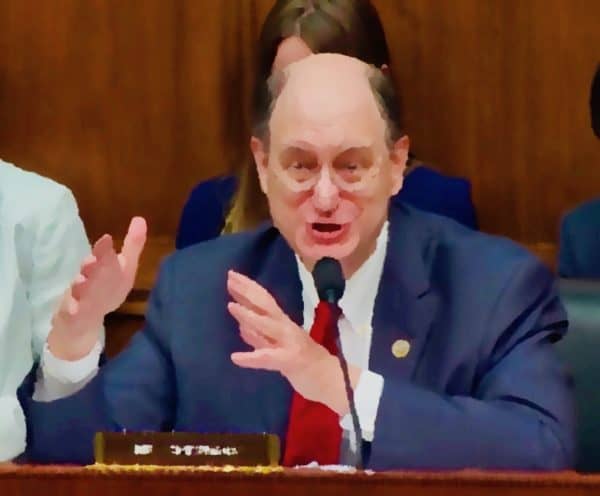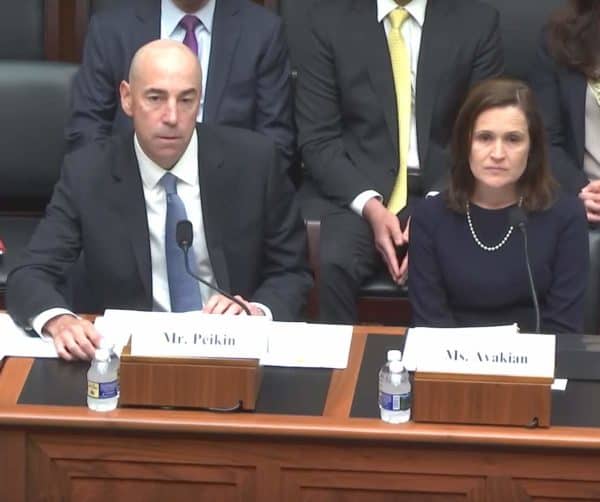Last week, while New York City saw thousands of cryptocurrency enthusiasts discuss the benefits of digital assets and blockchain, a House Financial Services subcommittee reviewed initial coin offerings with the leaders of the Securities and Exchange Commission (SEC) Enforcement Division. The Congressional Hearing provided a fascinating insight into the differences between elected officials as to the benefits, or intrinsic risk, regarding financial innovation and cryptocurrency.
The SEC enforcement division is the largest section of the SEC and, in many ways, is what the broader public is exposed to. During 2017, the SEC brought 754 enforcement actions against various individuals and businesses, generating $3.7 billion in disgorgement fees while returning $1.7 billion to harmed investors. This activity was a high water mark in recent years.
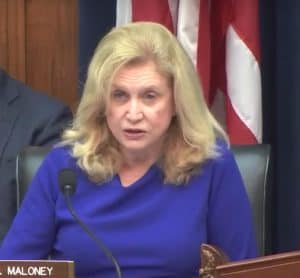 While the discussion ranged across a diverse number of topics, the debate regarding the merits of ICOs remains a pressing subject. The co-heads of the SEC Enforcement Division, Steven Peikin and Stephanie Avakian, were challenged on the SEC’s handling of ICOs numerous times throughout the hearing.
While the discussion ranged across a diverse number of topics, the debate regarding the merits of ICOs remains a pressing subject. The co-heads of the SEC Enforcement Division, Steven Peikin and Stephanie Avakian, were challenged on the SEC’s handling of ICOs numerous times throughout the hearing.
Ranking Minority Member Representative Carolyn Maloney kicked it all off by stating;
“The SEC has been very active recently in cracking down on fraud in virtual currencies and so called initial coin offerings or ICOs. This is important because retail investors are getting killed in virtual currencies which are being treated as speculative investments rather than currencies … This is a problem that we need to address …”
Taking things a step further, Representative Brad Sherman hammered ICOs calling on the SEC to shut them all down. Sherman believes they are all scams.
“You are beginning to do something on initial coin offerings. I would have hoped you would have done more. I hope you shut it all down … It will be interesting to find out what barriers you face in doing that.”
[clickToTweet tweet=”Representative Brad Sherman hammered #ICOs calling on the SEC to shut them all down” quote=”Representative Brad Sherman hammered #ICOs calling on the SEC to shut them all down”]
Sherman referred to ICOs as Ponzi schemes that are “valuable only because another sucker might be found and furthermore isn’t funding operating businesses.”
“It is true that someone funding an initial coin offering might give a small donation donation to the Red Cross,” said Sherman. “… every scoundrel does something good in their life but when somebody is trying to fund the creation of jobs, they’ve got to do it very carefully or your are on them for a misstatement for footnote 27. When somebody is selling cryptocurrencies to investors its taken you awhile to shut [them] down … I hope you will be … tougher on them than those that try to comply with the securities law.”
Peikin explained the challenges of dealing with Fintech innovation;
“In an effort to keep pace with technological change, we are focusing the enforcement division’s efforts and resources on emerging cyber related threats and issues related to hacking, data breaches, virtual currencies, and initial coin offerings. We think these are among the greatest risks facing investors in the financial markets today and we recently formed a cyber unit to focus on these issues.”
Maloney peppered the two witnesses as to when an ICO is a security in an apparent reference to the SAFT structure and the ability to morph from security to utility at some point;
“There has been a strong debate about whether a token that is offered as an ICO can be a security when it is first issued to investors and then later evolve into something that is not a security. Some people think that once it is a security, it is always a security, and others think that the tokens status as a security can change over time. As far as I know this is not a decision that has been decided by the SEC or the courts so I would like to ask both of you, do you believe it is possible for a token to start as a security and then evolve into something that is not a security.”
Avakian said this question may be better for CorpFin to address and said they will always refer to the “facts and circumstances test” to determine whether, or not, something is a security.
“We have dozens of investigations that are ongoing and one of the subjects of many of these investigations is evaluating whether or not a particular instrument is a security,” said Peikin. “I don’t think I can speak to the outcome of those because some of that work is ongoing. A lot of what we have seen though in these ICOs obviously looks and is … meets the definition of a security”
Maloney referenced the often quoted statement by SEC Chair Jay Clayton who famously said at one point, he had yet to see an ICO that was not a security.
“I cant speak to whether he has seen the broad gamut of instruments of that our division is investigating,” Peikin stated. “… I certainly don’t dispute that what he has seen … he believes is a security .. The question I guess is whether some of the things we are looking at now do they actually meet that definition and I think that some more needs to be written on that.”
Without providing any sort of quantifiable information, Maloney said that a great number or retail investors are being harmed by crypto. She asked Avakian and Peikin how the SEC determines which token offering to pursue.
“… we have a number of investigations in the pipeline. I think just speaking very broadly in terms of how we prioritize … things that require emergency action are going to come to the front of the priority list so there are some cases we have brought in the last months, like the Centra ICO, that was large ICO that involved celebrity promotion. The founders of that were arrested, assets were seized,” stated Avakian. “I think roughly $60 million in digital assets that were frozen … there are other cases … the Arise Bank case and the others … I think the ones where they require an asset freeze or emergency action are going to come to the top but there are others…”
Maloney inquired about private litigation and the possible benefits to having legal action take place beyond the confines of the SEC. The ICO space has seen many class action lawsuits brought to the courts. As many of these ICOs have been well funded they present a ripe opportunity for some lawyers to pursue.
“Do you believe that private lawsuits by investors can help supplement the enforcement divisions work? By deterring bad behavior that the SEC might not catch?” asked Maloney.
While stating that private litigation does not drive their decision as to which ICO to investigate, the SEC does use these cases as a source for information.
“Our main intersection with private securities litigation is that we will often use private securities litigation as a source to start an investigation of our own,” shared Peikin.
Representative Scott asked about the high profile AriseBank case. The SEC has pursued the founders of the ICO which saw the offering pumped by celebrity promoters. The founders were arrested by the FBI at one point.
“… this is one of the cases that Ms. Avakian referred to where we acted to obtain emergency relief,” Peikin said. “It turned out that it was a total scam, as we allege … the individuals were ultimately arrested and we seized digital assets … i think it is a great illustration of how these initial coin offerings can present real risks to investors and how we have been trying to work quickly to try and stop this type of fraud from going on.”
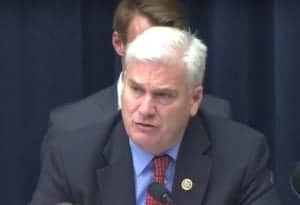 Congressman Emmer took an entirely different approach to the discussion. While Maloney and Sherman appear to believe crypto is equivalent to fraud and nothing less than a scam, Emmer expressed an entirely different point of view than his colleagues.
Congressman Emmer took an entirely different approach to the discussion. While Maloney and Sherman appear to believe crypto is equivalent to fraud and nothing less than a scam, Emmer expressed an entirely different point of view than his colleagues.
… You just testified that these initial coin offerings present a real risk to investors but lets not forget that they also present real opportunities,” said Emmer. “We are talking about blockchain technology that has an amazing potential I would like to go back to some of the questions… A lot of people with white hair or no hair don’t even understand what they are talking about.”
Emmer said his concern is that too much government may kill innovation before it grows into something that is good for the economy.
[clickToTweet tweet=”Congressman Emmer said his concern is that too much government may kill innovation before it grows into something that is good for the economy #Cryptocurrency #Blockchain” quote=”Congressman Emmer said his concern is that too much government may kill innovation before it grows into something that is good for the economy #Cryptocurrency #Blockchain”]
Inquiring about cryptocurrency exchanges, another area that is more than a bit gray, Emmer asked the two regulators about the amount of communication taking place between the marketplaces that trade in digital assets.
“We as an agency, broadly speaking, are engaging with the marketplace,” shared Avakian. “… although we are not necessarily in the best position to answer that particular question the reason is, as an agency, we have really worked together across divisions and across offices .. we’ve got a distributed ledger technology working group that is an intra-agency group, we have a Fintech working group that is an intra-agency group. Those groups, particularly the Fintech group have been working closely with the marketplace … “
Avakian said the Division of Trading and Markets would be at the frontline of the exchange issue but they are encouraging market participants to come to the SEC either via their Fintech email box or by directly reaching out to a particular division or office.
Emmer asked another great question as he attempted to pinpoint when an ICO is a security and when it is not.
“That is always going to be a facts and circumstances question,” Avakian clarified. “And again, we are going to take a step back and look at exactly what the substance of that particular transaction or token is, not the name of it. So is it something that someone is investing in something of value. Is it an enterprise that is investing in something to generate a profit based upon the effort of others. Thats the basic definition of whats a security.”
The regulatory environment is clearly evolving as the SEC navigates the digital asset landscape. Emmer said that there needs to be some delineated regulatory lines;
“We want to make certain they are continuing to explore the opportunity and not just going out of business,” said Emmer
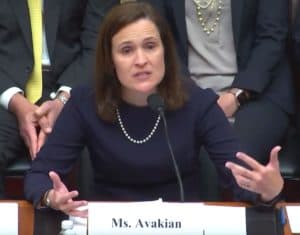 Interestingly, Avakian agreed with this statement.
Interestingly, Avakian agreed with this statement.
“We are open to having folks come to us and to help work through that analysis.”
Emmer thanked the duo for the SEC’s light touch approach.
Representative Davidson affirmed the need for regulatory clarity regarding ICOs.
Peikin said some of these issues are being worked out in the courts as they speak.
“Our office is working on an Initial coin offering bill that would provide certainty as,” Davidson shared … “how do you advise proceeding forward with your office?”
Peikin said they would be very interested in providing technical assistance regarding any proposal.
“Obviously, we would be interested in providing technical assistance and working with your staff on any proposal.”
Representative Scott asked another question about how widespread are the securities violations, quoting an article that was published in WSJ.com.
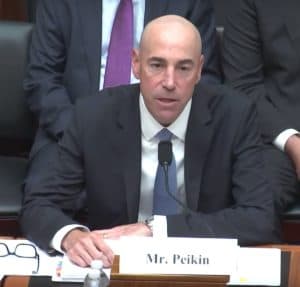 Peikin stated that there are two buckets. The first being clear acts of fraud like the AriseBank case and the second being alleged unregistered security offerings.
Peikin stated that there are two buckets. The first being clear acts of fraud like the AriseBank case and the second being alleged unregistered security offerings.
Peikin said there are many investigations ongoing and many have simply stopped after being informed they were in breach of existing securities law.
Asked if there is there anything Congress can do to help, Peikin said they have sufficient tools but the SEC would be willing to work with Congressional staff on any proposed legislation.
The Hearing highlighted the fragmented Congressional position between one side that believes in investor protection at all costs, even if it undermines innovation, and a more thoughtful approach of allowing change to occur, while keeping a mindful eye on fraud. Subcommittee Chair Huizenga called digital assets a “Platypus” – they don’t quite yet know what to do with the ICO issue.
The ICO regulatory environment will take more time but at least some members of Congress are willing to acknowledge their is potential for beneficial innovation and change.
Watch the entire hearing below.


